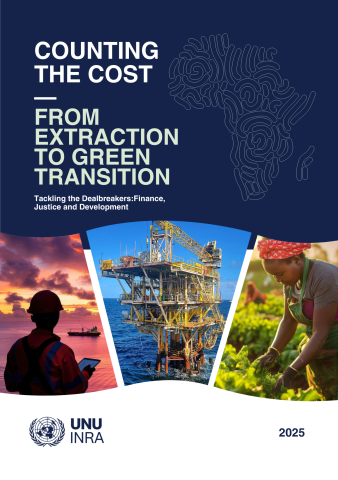
New UNU-INRA report uncovers the economic, social and justice costs of Africa’s green transition.
ADDIS ABABA, ETHIOPIA, 10 SEPTEMBER 2025 – A new report from the United Nations University Institute for Natural Resources in Africa (UNU-INRA) confronts one of the most urgent questions of our time: how can Africa navigate the global green transition while safeguarding development, ensuring justice, and protecting sovereignty?
The report, Counting the Cost: From Extraction to Green Transition – Tackling the Dealbreakers of Finance, Justice and Development, shows Africa’s unique paradox: it is the world’s lowest emitter of greenhouse gases yet among the most vulnerable to climate impacts. At the same time, the continent holds vast renewable and mineral wealth critical for the global green economy. With 75% of global cobalt, abundant solar and wind resources, and rapidly emerging hydrogen potential, Africa stands at a critical inflection point.
The study warns that multiple global crises are undermining sustainable development and increasing vulnerability across Africa, while debt burdens and weak adaptive capacity compound the pressures of climate change. Although Africa contributes little to global emissions, it is showing leadership in green development. Yet fossil-fuel dependent countries face the risk of stranded assets, with far-reaching consequences for jobs, incomes, and stability.
The report underscores that energy insecurity remains acute. Africa requires $25–50 billion annually to achieve universal energy access by 2030, and a further $200 billion each year to finance its climate commitments (NDCs). However, current climate finance mechanisms continue to favour loans over grants, exposing the continent to new layers of debt.
Meanwhile, the EU’s Carbon Border Adjustment Mechanism threatens to erode Africa’s export earnings, raising fundamental equity concerns. Speaking at the Second African Climate Summit in Addis Ababa, Prof. Fatima Denton, UNU-INRA Director and lead author of the report, noted: “Africa is asked to act as a carbon sink for the world, but there is no compensation or support mechanism to match this demand.”
Despite these risks, the report highlights Africa’s opportunities. The continent’s vast renewable and mineral wealth offers a unique chance to lead in the green economy, but only if countries retain ownership and ensure domestic value addition. Without this, Africa risks repeating extractive patterns of the past.
What is needed, the report argues, is green industrialization: powered by clean energy, anchored in critical mineral value chains, and designed to create jobs, build resilient infrastructure, and foster prosperity while respecting planetary boundaries. Regional integration — through intra-African trade, policy alignment, and joint infrastructure — will be essential to strengthen bargaining power and maximize the continent’s resource potential.
“Justice must be at the heart of the green transition,” said Prof. Denton. “Africa cannot remain a cheap carbon sink or a raw materials supplier for the world. The transition must deliver sovereignty, resilience, and prosperity for African people.”
Counting the costs of green transition compared to inaction will enable proactive planning and early action to avoid economic disruptions and ensure a just, resilient and inclusive transition. “Until Africa gives itself the space to change the narrative radically, countries that are high polluters will continue to dictate,” Denton advised.
Access the report:
Counting the Cost: from Extraction to Green Transition – Tackling the Dealbreakers of Finance, Justice, and Development is available to download here.
The press release is available here: https://unu.edu/inra/press-release/acs2-new-unu-inra-report-uncovers-economic-social-and-justice-costs-africas
For more information contact:
Qondi Moyo (moyo@unu.edu)
Vanessa Awanyo (vawanyo@unu.edu)



